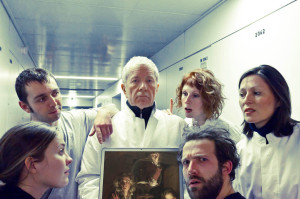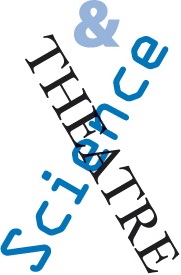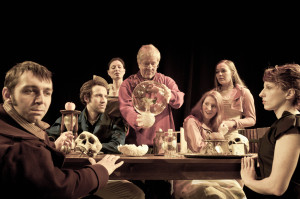by SHELAGH STEPHENSON
 A social drama, a science play, a thriller
A social drama, a science play, a thriller
Something revolutionary is happening at the Fenwicks’, while there’s trouble in the air at Ellen and Tom’s. Fenwick is taking science to dizzying heights, his assistant is after the maid and a mob is rioting at the front door. Ellen, a geneticist, has moral qualms about a job offer and Tom is unemployed. The Fenwicks are living in 1799, Ellen and Tom in 1999 – in the same house. There’s a body in the basement. Who buried it there 200 years ago?
Shelagh Stephenson explores the question of how much morality science can take – and how much it needs – with two compelling examples from two different times in history. To what lengths should the study of anatomy go to procure cadavers at the end of the 18th century? And how far should genetics go at the beginning of the 21st century?
What is good and what is evil science? Shelagh Stephenson projects this question further back in time than most do. Academic debate on the ethical limits to scientific research often focuses on the atomic bomb and unscrupulous Nazi researchers. However, the long period in which body snatching was commonplace for the study of anatomy goes back 150 years before then and is a dark chapter in the history of colonial England between Newton and Darwin.
Modern genetics is constantly forced to deal with the heatedly debated social relevance of its work and results. Genomic research will soon be able to decode our entire genetic make-up at little expense. Will we soon find out in the neighbourhood “Gene Shop” that we are particularly susceptible to alcoholism, cancer, or Alzheimer? Is that something to take seriously? And is it something that we want to know? Who else might want to know, and why?
An Experiment With an Air Pump was the second production in our Science & Theatre program.
Supported by 
![]()
Shelagh Stephenson was born in Northumberland and read drama at Manchester University. Her first play, The Memory of Water (1995) was a huge success and won her an Olivier Award for Best Comedy; her second one, An Experiment with an Air Pump (1998) was equally sucessful and won the Peggy Ramsay Memorial Award. Other plays are Ancient Lights (2000), Mappa Mundi (2002), and Enlightenment (2005). Her latest one is A Northern Odyssey (2010) about American painter Winslow Homer´s two-year visit to Northumberland in the early 1880s. She has also written numerous radio plays and TV scripts. The Memory of Water was made into a film called Before You Go (2002) starring Julie Walters and Tom Wilkinson and directed by Lewis Gilbert.
pics: Christian Jungeblodt
- Tues, February 8, 2011 | 8pmMain Stage
with 14 additional performances until Febr 27, 2011
With Richard Penny, Julie Trappett, Tomas Spencer, Lee Stripe, Ciara Goss, Carolyn Walsh, Elisabet Johannesdottir
Directed by Günther Grosser
Set Design: Tomas Fitzpatrick
Costume Design: Ilaria Di Carlo
Lighting Design: Katri Kuusimäki
Dramaturg: Triona Humphries
Stage Management: Ruby Grosser
Scientific Coordinator: Prof. Regine Hengge (Institute for Biology / Microbiology at the Freie Universität Berlin)
On Friday February 11th at 7pm Prof. H. Hilper Ropers (Max-Planck-Institut für Molekulare Genetik Berlin): Pre-Show Talk on THE 1000$ GENOME AND ITS CONSEQUENCES FOR RESEARCH AND HEALTH CARE.
Links
- review in The Local (English)
- review in Der Tagesspiegel (German)
- English Theatre Berlin´s Science & Theatre programm

Science & Theatre: An Experiment With an Air Pump von Shelagh Stephenson
 Ein Sozialdrama, ein Wissenschaftsstück, ein Thriller.
Ein Sozialdrama, ein Wissenschaftsstück, ein Thriller.
Im Hause der Fenwicks tut sich Revolutionäres, während bei Ellen und Tom der Haussegen schief hängt. Fenwick treibt die Wissenschaft zu Höhenflügen, sein Mitarbeiter ist hinter der Magd her, vor der Tür randaliert der Mob. Die Genetikerin Ellen hat moralische Bedenken wegen eines Jobangebots, Tom ist arbeitslos. Die Fenwicks leben 1799, Ellen und Tom 1999 – im selben Haus. Im Keller liegt eine Leiche. Wer hat sie vor 200 Jahren dort vergraben?
Mit zwei fesselnden Geschichten auf zwei historischen Ebenen geht Shelagh Stephenson der Frage nach, wie viel Moral die Wissenschaft verträgt – und wie viel sie braucht. Wieweit darf die Anatomie im ausgehenden 18. Jahrhunderts bei der Beschaffung von Leichen für ihre Studien gehen? Und welche Grenzen darf die Genetik des beginnenden 21. Jahrhunderts überschreiten?
Was ist Wissenschaft zum Guten und zum Bösen? Shelagh Stephenson lässt diese Frage noch weiter in die Vergangenheit klingen, als man es gemeinhin tut. Während sonst die Atombombe und skrupellose Nazi-Forscher die Fixpunkte eines ethischen und wissenschaftshistorischen Diskurses über wissenschaftliche Forschung und ihre Schranken bilden, nimmt Stephenson die lange Zeit zum Zwecke der anatomischen Forschung üblichen Leichendiebstähle zum Gegenstand. Diese liegen mehr als 150 Jahre zurück und bilden ein dunkles Kapitel in der Geschichte des kolonialen England in der Ära zwischen Newton und Darwin. Auch die moderne Genetik muss sich immer wieder heftigen Debatten über die gesellschaftliche Relevanz ihrer Arbeit und ihrer Resultate stellen. Bald wird etwa die Genomforschung ohne großen Aufwand unser gesamtes Erbgut entschlüsseln können. Werden wir dann im nächstgelegenen “Gen-Shop“ erfahren, dass wir anfällig sind für Alkoholismus, Krebs oder Alzheimer? Können wir dies ernst nehmen? Wollen wir es überhaupt wissen? Und wer sonst hätte noch Interesse daran – und warum??
Shelagh Stephenson stammt aus dem nordost-englischen Northumberland und studierte Theater an der Universität Manchester. Ihr erstes Stück The Memory of Water (1995) war ein Riesenerfolg und wurde mit dem Olivier-Award für die beste Komödie ausgezeichnet; ihr zweites, An Experiment with an Air Pump (1998), wurde zu einem ähnlich großen Erfolg und erhielt den Peggy-Ramsay-Award; weitere Stücke sind Ancient Lights (2000), Mappa Mundi (2002) und Enlightenment (2005); zuletzt hatte A Northern Odyssey (2010) in Newcastle Premiere, ein Stück über den mehrjährigen Nordengland-Aufenthalt des amerikanischen Malers Winslow Homer in den frühen 1880er Jahren. The Memory of Water wurde 2002 unter dem Titel Before You Go mit Julie Walters und Tom Wilkinson verfilmt.